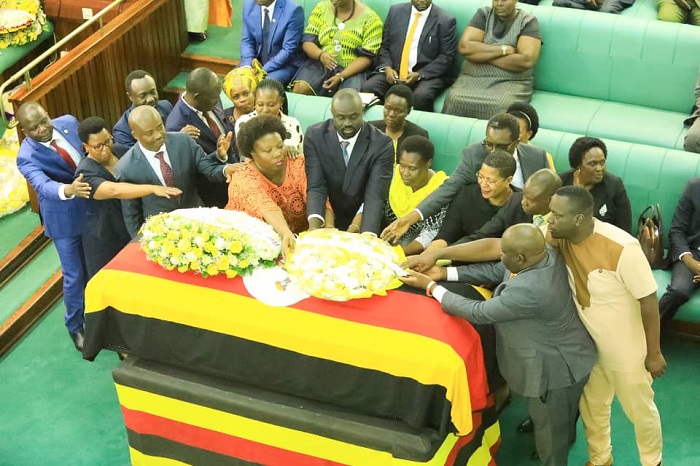
Refugees, host communities join partners in regreening Yumbe
- FEATUREDNEWS
- May 15, 2024
- No Comment
By Andrew Cohen Amvesi
YUMBE. Swali Azubu’s son was a renowned charcoal dealer in Gbiria village, Ariwa sub-county in Yumbe district.
Mahad Munguci used to wake up every morning to cut down trees in the neighborhood for burning charcoal as his usual means of earning quick money.
One day, Azubu, who was fed up with Munguci’s actions, decided to stop him from cutting down the trees. He highlighted the importance of the trees being cut and the dangers associated with the act in the near future.

“I told my son that these trees he is cutting down help in attracting rainfall, they can be used as firewood and the leaves can be used as fodder for animals. I told him when he continues cutting down these trees, it will bring challenges at home and that is how he stopped. I then started saving these trees from being extinct,” Azubu said during a visit to his farm on Monday May 13, 2024.

Azubu’s love for the environment later propelled the community members to recommend him to World Vision Uganda as a champion for the Regreening Project, an opportunity he had no idea of.
His selection was during one of the dialogue and sensitization meetings held in the area by the World Vision team at the onset of the project in 2021.

The five-year regreening project funded by World Vision Australia aims at promoting landscape protection and restoration to improve food security, livelihoods and community resilience to climate related shocks and stresses, especially for the most vulnerable refugee and host community through inclusive individual and collective actions among 40,000 people by 2026.
It is being implemented in the sub counties of Ariwa and Odravu in Yumbe district by a consortium of partners with World Vision International as the lead partner, Catholic Relief Services (CRS) and Care International in Uganda.
But when Azubu was selected, he underwent several training in conserving the environment, especially on how to embrace the Farmer Managed Natural Regeneration (FMNR) practice.
FMNR, according to Geoffrey Muhumuza, the Regreening Communities Project Manager, is a low-cost, simple, sustainable land regeneration practice that communities can use to restore their land, increase their productivity and build resilience relatively quickly and efficiently.
FMNR is equally a tree management practice, involving selection, pruning, protection and maintenance, and a community empowerment practice, re-greening both community mindsets and people’s relationships with nature and their landscape.
The main goal of practicing FMNR is to contribute to production of more food and better nutrition.
“After my training by World Vision, I came back home and started practicing FMNR starting with the tree stumps my son had cut. World Vision later gave me 10 beehives which have all colonized, I added another five on top and I’m now hoping to harvest enough honey this year. I’m also rearing 10 cows, 12 goats and 8 sheep on my 2.1-acre piece of FMNR land. Besides, I have a demonstration farm I established on which I have planted fruits and other trees. So, any time I need money, I just sell some goats or fruits, firewood and use the money to pay school fees and also feed my family,” Azubu explained.
Azubu has gone ahead to train seven other FMNR champions including Adnan Mafu, a resident of the same village.
Mafu said the natural trees they are preserving through the FMNR practice are helping them with poles for constructing houses, wood lots and herbs among other needs. He called for more funding for the implementing partners so that they (locals) can continue benefiting from the project.
Similarly, John Guya, a refugee and the secretary of Loketa farmers’ group in Zone 4, Bidi Bidi settlement said they were trained by CRS on how to cultivate using the climate smart agriculture model to improve productivity, household food security and also protect the environment.
As a result, Guya noted that their group which consists of 30 members has embarked on cassava production on the 10-acre piece of land provided by the Office of the Prime Minister (OPM). He said they usually harvest the cassava for food and sell part of it to fulfill other family needs.
During the visit to Azubu’s farm on Tuesday, the Members of Parliament sitting on the community of Uganda Parliamentary Alliance on Food and Nutrition Security led by Hon Milton Muwuma commended World Vision Uganda, CRS and Care Uganda for empowering refugees and host communities in promoting food security and conserving the environment through the regreening project.
Muwuma said one of the positives he picked from Azubu’s demonstration farm is enterprise mix.
“This man can never sleep hungry. If the mangoes are done, cassava is here. If he is not making money in this one, the bees, apiary are working. So, he has grasped that message the President normally preaches, telling people enterprise selection and enterprise mix. I’m happy he has also embraced the issue of education, he was giving accountability, he has a S.4 candidate, he has children he has sent for skilling, so let us encourage him,” Muwuma remarked.
Melisa Neima Avako, the Yumbe district Woman MP who accompanied the committee members to the district called upon the people of Yumbe district to continue embracing the regreening project.
“It should be our duty to make sure that all issues related to the environment are handled with a lot of caution so that our human activities don’t create a negative impact on our environment,” Avako appealed.
Meanwhile York Alioni Odria, the Aringa South MP offered 100 acres of land for World Vision to set up a demonstration farm where the youths can go and learn.
He recommended that World Vision should consider going for massive tree planting especially fruit trees like avocado and mangoes in order to feed the fruit factory in the district.
In his remarks, Jeremiah Nyagah, the World Vision National Director urged the government to invest, embrace and pilot agro-ecological practices like FMNR approach in food security, nutrition and reforestation policies.
He said any new and continuing development strategy, plan and policy should seek to address climate change and environmental degradation as part of the core objectives.
According to Serbeet Kawawa Guma, the Yumbe district Natural Resource Officer, deforestation rate in the district stands at 1.4 percent annually, up from 1 percent. He said the situation was worsened by the coming of refugees.





